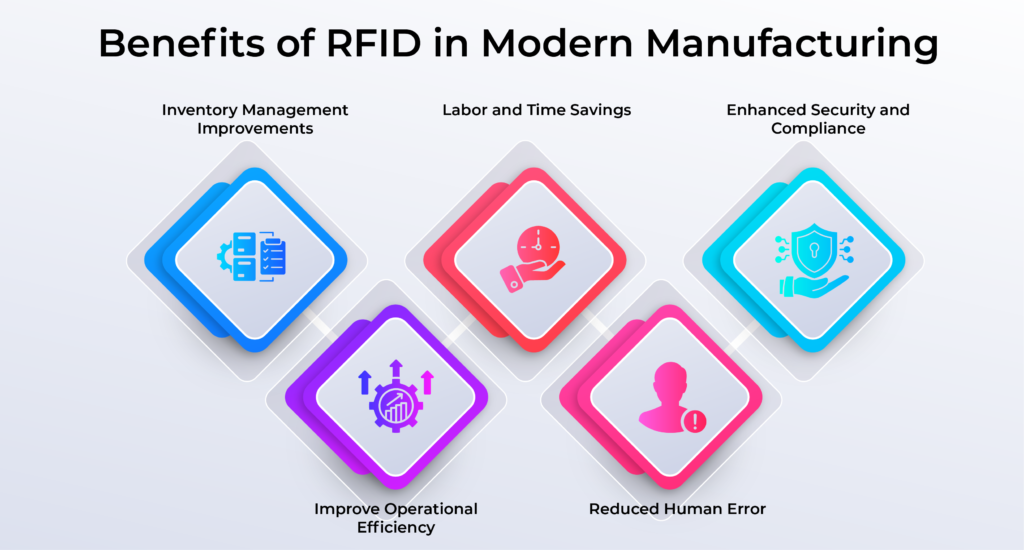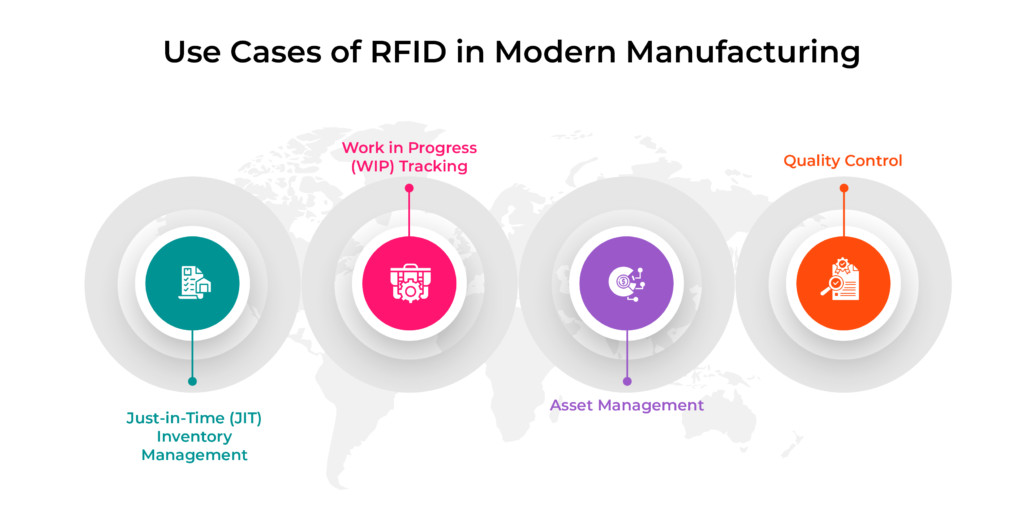RFID technology transforms modern manufacturing by providing enhanced visibility and control over inventory and assets. Utilizing radio waves to identify and track items automatically, streamlines operations and boosts productivity in an increasingly fast-paced environment. As industries continue to embrace digital transformation, RFID technology stands at the forefront of revolutionizing operational efficiency, enhancing productivity, and streamlining inventory management processes for manufacturing plants worldwide.
Radio Frequency Identification
RFID is a technology that uses electromagnetic fields to automatically identify and track tags attached to objects. These tags contain electronically stored information that can be read by RFID readers, enabling real-time data collection and management.
Components of RFID Systems
1. RFID Tags: Small electronic devices that consist of a chip and an antenna. These tags can be either passive (powered by the reader’s electromagnetic field) or active (with their own power source), and store unique identification data that can be transmitted to RFID readers.
2. RFID Readers: These devices emit radio waves to communicate with RFID tags. They capture the data stored on the tags and send it to a computer system for processing.
3. Middleware and Software: This component processes the data collected by RFID readers, integrating it with existing systems for inventory management, asset tracking, and more. TagMatiks Core RFID software serves as the central platform that manages data flow between RFID hardware and enterprise systems.
How RFID Works
The RFID process begins when an RFID tag comes within range of an RFID reader. The reader emits a radio signal that activates the tag, prompting it to transmit its stored information. This data is then captured by the reader and sent to a software system for analysis and management, allowing for real-time tracking and monitoring.
Key Benefits of RFID in Modern Manufacturing

Inventory Management Improvements
Real-time Tracking: RFID technology allows manufacturers to monitor their inventory movement instantly. For example, as products move through the facility, RFID readers automatically detect and record their location, quantity, and status. This eliminates the lag time between physical movement and system updates, enabling managers to see exactly what’s in stock and where it’s located at any given moment.
Minimization of Stock Inconsistencies: Traditional manual counting often leads to errors due to human oversight or miscounting. RFID eliminates these issues by automatically scanning and counting items, ensuring that physical inventory matches system records. This reduces costly write-offs and prevents stockouts or overstock situations.
Enhanced Operational Efficiency
Streamlined Production Processes: RFID technology ensures smooth production flow by tracking materials through each manufacturing stage. The system can automatically trigger reorders when materials run low, preventing production delays. This just-in-time inventory management optimizes resource utilization and maintains continuous production.
Reduced Downtime: By providing real-time monitoring of equipment and materials, RFID helps prevent unexpected stoppages. The system can alert maintenance teams before problems occur and ensure that necessary parts are always available, minimizing costly production interruptions.
Labor and Time Savings
Faster Inventory Counts: Instead of manually counting each item, RFID readers can scan hundreds of tagged items simultaneously in seconds. This dramatically reduces the time needed for inventory audits from days to hours, or even minutes, allowing for more frequent and accurate inventory checks.
Automation of Data Entry: Manual data entry is prone to errors and consumes significant staff time. RFID automates this process by capturing and recording data automatically. Staff members can then focus on more valuable tasks like analysis, customer service, and process improvement.
Reduced Human Error
Accurate Data Capture: RFID systems eliminate manual counting and data entry errors. Each item’s movement is automatically recorded with 99%+ accuracy, providing reliable data for inventory management and decision-making.
Improved Decision-Making: With accurate, real-time data, managers can make better-informed decisions about inventory levels, production scheduling, and resource allocation. This leads to optimized operations and reduced costs.
Enhanced Security and Compliance
Better Control Over Access: RFID technology can track who accesses specific areas or assets when they do so, and for how long. This creates an audit trail for security purposes and helps prevent unauthorized access to sensitive areas or theft of valuable assets.
Compliance with Industry Regulations: Many industries require detailed tracking of inventory, production processes, and quality control measures. RFID automatically creates and maintains these records, making it easier to demonstrate compliance during audits and inspections. The system can also flag any compliance issues in real-time, allowing for immediate corrective action.
Use Cases of RFID in Modern Manufacturing

Just-in-Time (JIT) Inventory Management
RFID technology plays a pivotal role in implementing Just-in-Time inventory management by providing real-time tracking and monitoring capabilities that ensure materials arrive exactly when needed in the production process. This precise timing eliminates the need to maintain large inventory stockpiles, as the system can automatically trigger orders based on predefined thresholds. The direct benefit of this approach is a significant reduction in holding costs – the expenses associated with storing and maintaining inventory. Manufacturers can improve their cash flow and allocate resources more effectively by minimizing warehouse space requirements, insurance costs, and the risk of obsolescence.
Work in Progress (WIP) Tracking
The implementation of RFID technology transforms Work in Progress tracking by providing manufacturers with unprecedented real-time visibility into their production processes. Each item in production can be tracked at every stage, offering instant insights into its location, status, and time spent at each production step. This comprehensive visibility enables manufacturers to identify and address bottlenecks quickly, optimize production flow, and make data-driven decisions to enhance efficiency.
Asset Management
RFID technology revolutionizes asset management in manufacturing facilities by enabling precise tracking of tools, equipment, and other valuable assets throughout the premises. The system maintains a real-time inventory of all tagged assets, including their location, usage history, and maintenance records. This comprehensive tracking capability ensures that essential tools and equipment are available when and where they’re needed, preventing costly production delays. By maintaining accurate records of asset movement and usage, manufacturers can significantly reduce losses due to misplacement or theft, minimize equipment downtime, and optimize maintenance schedules.
Quality Control
RFID technology enhances quality control processes by enabling continuous monitoring and verification at every stage of production. The system can track each product’s journey through the manufacturing process, recording important quality parameters, test results, and compliance checks. This detailed tracking ensures that products meet required quality standards and specifications before moving to the next production stage. The automatic recording of quality data creates a comprehensive audit trail that proves invaluable for regulatory compliance and certification requirements. In case of quality issues, manufacturers can quickly trace the affected products, identify the root cause, and implement corrective measures.
Applications of RFID in Modern Manufacturing
Electronics Manufacturing
In the electronics sector, RFID tracking systems have become indispensable for managing complex assembly processes. The technology enables manufacturers to track individual components from receipt through assembly to final distribution. RFID tags attached to circuit boards, semiconductors, and other electronic components provide real-time visibility into the production process. This precise tracking helps prevent counterfeit parts from entering the supply chain, ensures correct component placement, and maintains quality control throughout assembly. The RFID in manufacturing systems also enables automated inventory management, reducing manual errors and improving production efficiency. For instance, when components are running low, the system automatically triggers reorder notifications, preventing production delays.
Food and Beverage Industry
The implementation of RFID tracking systems in food and beverage manufacturing has significantly enhanced food safety and traceability. RFID tags track products from raw material receipt through processing, packaging, and distribution, creating a comprehensive digital trail. This visibility is crucial for maintaining compliance with food safety regulations and managing recalls effectively if needed. The RFID in manufacturing technology also helps monitor temperature-sensitive items during storage and transportation, ensuring product quality and safety. Real-time inventory tracking helps reduce waste by managing expiration dates more effectively and optimizing stock rotation. The system also facilitates faster product recalls by instantly identifying affected batches and their current location in the supply chain.
Pharmaceutical Manufacturing
In pharmaceuticals, RFID tracking systems play a critical role in maintaining regulatory compliance and ensuring product authenticity. The technology enables manufacturers to track medications throughout the production process, from raw material handling to final packaging. RFID in manufacturing helps prevent counterfeiting through unique identification codes and provides a complete chain of custody for each product. The system maintains detailed records of production conditions, storage temperatures, and handling procedures, ensuring compliance with Good Manufacturing Practice (GMP) regulations. RFID tags also help track expiration dates, manage recalls efficiently, and maintain proper storage conditions for temperature-sensitive medications. This level of tracking and monitoring is essential for meeting stringent pharmaceutical industry regulations and maintaining patient safety.
Conclusion
RFID technology is a game-changer for modern manufacturing plants, offering numerous benefits such as improved inventory management, enhanced operational efficiency, and reduced human error. By embracing RFID, manufacturers can streamline their processes, reduce costs, and stay competitive in an ever-evolving industry. If you’re considering implementing RFID in your operations, now is the time to explore its potential and transform your manufacturing processes for the better.
